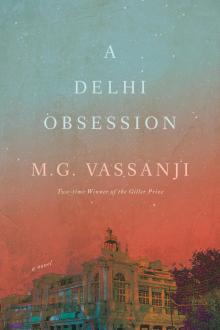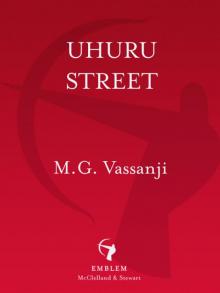- Home
- M G Vassanji
The Gunny Sack Page 13
The Gunny Sack Read online
Page 13
To go down to the shop from our flat we had to pass their floor, and when a fight was in progress we trod it with special care, even gingerly. There would be howls and screams, objects smashing, bodies falling. It would not have taken much provocation, it seemed, for the whole lot of them to stop fighting among themselves and fall on you like a pack of wild monkeys.
How memory makes monkeys out of our enemies … We thought of them only as howls of madness, of a family gone collectively berserk, but now I think of the sorrow, the frustration. Eh, Shehru—what, no better memories? Not a word of kindness or understanding? Only the bitterness, Ahmed sitting at the bottom of the staircase, legs stretched out, daring you to step over, the howls under the dark staircase, the ambushes on the stairs at night … and Kulsum would complain to their grandfather the landlord, to the numerous uncles and aunts. Periodically, the grandfather came to mete out punishment. He was a small, thin man in a crumpled white suit and a black fez. He brought with him a stick which he held firmly and with obvious purpose. When the doors closed behind him the howls became ferocious, interspersed with the old man’s imprecations. It seemed then that the rest of Kichwele and Viongozi held their breath, throwing glances towards the bedlam, as if to say, What now?
No, the reconciliation came later, a truce really, and it had to be paid for, in cash.
My cousin Shamim, after a few months with Fatu Auntie who would scrub her body with Vim to make her whiter, came to stay with us. There were then six of us, with Kulsum, in the two rooms. There was Begum, of course. Then Mehroon and Yasmin who were my Aunt Gula’s; and finally Shamim, Sona and I. Mehroon was now ours; but Yasmin by a family decision belonged to Bahdur Uncle, Shamim’s father who was seeking a fortune in the interior.
In the sitting room, which was brightened with tube lights, was Kulsum’s big double bed on which she would sit in the evenings cutting patterns from bolts of cloth for the next day’s sewing. The radio would be on, turned low, and home-works done in various corners. Sona and I would be sent to bed, and when the rest of the family turned in, the one of us whose turn it was would be taken to Kulsum’s bed to sleep with her. The other would sleep with one of the older girls.
We fought, Sona and I, we fought, and cheated, and cried, to share our mother’s bed, to feel her tight smothering embrace as she murmured endearments at us …
In the afternoon, after school, the girls helped in the store, while Sona and I were put to bed and locked in, upstairs. When we awoke after the nap, it would already be getting dark, most of the day was over, and in a panic we would rush to the window and cry for our release. Downstairs there would be more of us than customers, fighting over snacks of roasted cassava and corn and the occasional bottle of Coke, as the three tailors came in before closing time bringing their day’s work, which would be tallied and noted down against their names in a big ledger and their thumb-prints or signatures taken against the entries. Hassan Uncle had advised Kulsum to take a signature for everything.
At the month’s end, or in the days preceding the Eid, the store stayed open late and everyone was downstairs at once; all were needed, to show customers, to wrap, give change, or simply to watch out for the 420s. Kulsum always sat at the head of the store, behind the big centre display counter watching over the cashbox, on a high stool … and when business was slack she would be looking out, straight ahead, brooding, picking her chin …
The Fancy Shop never made much money, but from the beginning it stood apart from the other shops of the Corner. For one thing there was the number of children you would find helping to run it. Then there was the display window, large and prominent between the two doorways—you could not miss it from the street. Here Begum arranged her creations—inspired by Nairobi of course—of matching children’s wear suspended over toyland still-life. Street scenes, drawing-room scenes, cottonwoolly, sequinned Christmases, at which African boys and girls would come and gaze for long mouth-watering minutes. The other stores started copying, their windows hitherto dark and boarded up were now lit, as Begum proudly noted. They could not keep up with her, and they did not like her, this arrogant Victoria of ours, but they couldn’t help admiring her.
What shall we do with the drunken sailor?
What shall we do with the drunken sailor?
What shall we do with the drunken sailor earleye in the morning?
Miss Penny, not yet Mrs. Gaunt, walks primly in front of us in high heels and dress suit. In a line of twos holding hands our class crawls forward, a brown-and-black millipede in khaki and white. She stops, turns, waits and inspects as the line moves past her, getting tighter as the stragglers catch on, picking up voice. Then she thrusts forward, tall and straight, slim and shapely, striding easily on her high heels as if she were floating, clean and sweatless. You could sing in front of Mrs. Perera or Mrs. Nanji until you got hoarse or they pleaded for you to stop, but how difficult, positively awkward, it was to sing before Miss Penny! Her voice was sharp and precisely defined, her syllables clipped, beside which our shapeless self-conscious phonemes proceeded higgledy-piggledy, running into each other in a mumble.
(There speaks a true colonial, the voice of a conquered one, says the gunny voice from the corner in its most radical tone.
Shush, Shehrbanoo. Wasn’t I conquered, didn’t she vanquish me? Tell me.)
“Miss—” A boy gets up from his place and gives her a yellow rose in full bloom, not overly ripe.
“Why, thank you!” says an appreciative Miss Penny with a smile just so and not overdone. She sniffs at it and puts it into her buttonhole. “What’s your name?”
“Alnasir, Miss.” Cheeky Bottoms to the boys. His accent is the closest to hers and he is of course a teacher’s pet. He has an elder sister who coaches him in these tricks. They have to be done just right. Watch.
“Miss.” A shy voice, barely audible, which has to be repeated to be heard. A second rose is proffered, this one hardly in bloom yet, still half-covered by the green and brown calyx, and this one by the other Alnasir, the crier.
“Thank you. And what’s your name?”
“Alnasir.”
“A second one! All right—now you, Alnasir, begin the song ‘Alouette.’ ”
The obsequies over, Cheeky Bottoms starts the song and a hesitant chorus accompanies him. The snivelling Alnasir takes his seat on the ground with the rest, and the second rose stays in the hand. Miss Penny sits on a chair, legs crossed, the class in front of her, under a mango tree in the grove behind the school. It is the outing period.
Soon a boy comes running out of the back gate, starts walking and stops a few feet away from the class as at an imaginary door.
“Please-may-I-come-in?” he calls out in urgency, raising a hand and bending a little at the waist as if he’s asking to go to the lavatory.
Miss Penny doesn’t hear him. She is looking the other way, through the shady grove past the scrub and to the road beyond. “Please-may-I-come-in?”
She turns to look. “That’s not a door, silly! Why are you late? Did you report to Mrs. Schwering?”
“Yes, miss.”
“All right. Sit down.”
Permission granted, Hassam sits down.
He is the future teen idol: Elvis and Beatle, then Iblis. Small boys will want to emulate him, girls will flock to him, but there is no trace on him of that future renown and manner. There are in this class now, singing a song of sixpence, their potentials also hidden: a future motel-chain owner in California, a few smugglers, a thief, two pharmacists, two accountants, a nervous scientist, and a Lisbon bar owner … There is Shivji Shame who will never get past Standard IV, big, bluff, who always gets told off but never knows why. As Miss Penny looks left and right, reflecting, book in hand, and Cheeky Bottoms leads the song, others at the back play with toy cars in the sand, and some are already portioning out the mangoes in the tree.
I was admitted to school on my first day by Mr. Menezes, a Goan neighbour whom Sona and I called Uncle Goa. His wife was a teacher i
n the Girls’ School and we called her Madam. Uncle Goa worked at the East African Customs and Harbours, and every morning drove to work in his dirty green Morris, in civil servant’s spotless white shirt, shorts and stockings and black, polished shoes. On this occasion he took me to school, before going on to work, and enrolled me.
“Grandfather’s name first,” said the application form, and Uncle Goa asked me.
“Huseni,” I said, naming my renegade half-caste ancestor, and became Huseni Salim Juma for ever after.
The rest of my family ignored the whole question and became Dhanji, even the more classy Dhanjee, a name invoking wealth and respect, while I, under the auspices of Uncle Goa and Mrs. Schwering’s glaring eye, became: anybody. No trace of tribe, caste, colour, even continent of origin. How much in a name? Salim Juma, the name chose me, and it chose my future and this basement in which I hide myself with my gunny, where the clip-clop sounds of feet outside remind me of Miss Penny and the Boys’ Primary School.
I joined school when there was a virtual reign of terror under Mrs. Schwering. Every day after the morning prayers had been shouted out to God (“Give health, happiness and peace to our worthy teachers, parents and all our brethren, amen! Give us the divine guidance to make us worthy students of this school, amen! …”), Mrs. Schwering, before dismissing the assembly, would swoop down on a class for a spot check: fierce Mrs. Schwering with blond curls and loose, haltered dresses revealing a fiery red chest, with hands on her hips inspecting two lines of nervous students standing to attention conscious of every hidden blemish in their attire. And out, frayed collars, unironed clothes, dirty shoes: out, dirty fingernails, uncombed hair, dusty knees: and out, every time she inspected our class, big Shivji Shame with stained shorts, no underwear—looking unsymmetrical in front and pathetically threatening—and wearing brown, dusty Jumbo rubber shoes minus socks. Whining, oversized Shivji Shame who could not answer a proper word in English would be brought out in front of the assembly and a crowd of happy cheering boys would howl “Shame, shame, Shivji, shame!” After which he would be sent home; but he never went home, he would wait outside and come out to play during recess or when school was over.
Every day after school, I waited by the back gate near the outing area for my sister and cousins. School for the first two classes ended half an hour earlier. Cars, some with chauffeurs and others with fathers, waited in the shade of the trees. Vendors of mangoes, guavas, coconuts and potatoes with chutney sat in a row and called out. Some of my more seasoned classmates already started trudging home, others sat in cars, still others rode on servants’ shoulders or waited as I did, drinking warm water from the tap which protruded from under the hedge. Then the bell would clang, a noise would erupt and the older children flowed out from all directions. There would be running and thumping, banging of doors and shouting. Scores mounted up during the morning were settled now and a circle of boys would form, cheering around two figures grappling in the dirt. Soon a father would emerge from a car, or a chauffeur or a teacher, and break up the fight.
Sometimes, just before the bell, the Coca Cola seller, a burly Indian, would arrive with some orderlies; as soon as they saw him the hawkers would gather up their money and run. This was the fujo. The boys would shout “Fujo!” and scramble for the food. Sometimes even when the Coca Cola seller had not arrived, the bigger boys raised a false alarm. Everyone loved a good fujo, you got free khungus and potatoes and guavas, thope-thopes, kitales, mangoes … except that … you remembered for a long time the frightened face of the vendor who ran as if for his very life, particularly the new one, the youngest …
And throughout the arduous walk back home, avoiding potholes on Msimbazi Street, looking away from the glaring sun as from suspicious-looking characters, my fibre schoolbag with its slate and two broken halves of pen in my hand, there would be Begum’s constant chatter, her running commentary on the day’s events in her class. Begum our leader, the strict disciplinarian, mother’s lieutenant at home: tall and thin, walking confidently on, ignoring catcalls, talking, talking and you dared not interrupt her. Her classroom leapt to life on the dusty road, a mirage in a hot desert. Zarina Alibhai, Farida Damji, Parviz Meghji … and others, I watched them grow up in these mirages and other images evoked for us by Begum; I know things about them they’ve long forgotten or care not to remember.
Behind the school was a large, overgrown, sunken piece of land which filled knee-high with water when the rains were severe. The girls stayed home on such days, unless they found a ride that would take them to and from the front gate of their school. I and other smaller boys would then go in a large pack headed by some bigger boys, and we would cross the lake, removing our shoes and socks and wading through the field, sometimes pushing paper boats or coconut branches in the water. The following day we would watch in dread for signs of jigger on our soles.
Once when the water subsided, an Indian woman’s body was dragged out … rotting flesh, fragments of a sari, unclaimed, not missed … Suicide, they said, or murder; what matter? Perhaps she could not bear a child. Perhaps she did not bring a good enough dowry. Why this fragment, Shehru, this frayed remnant of a memory? A tribute, she says, to an unknown woman, a woman with her own memories and her own world.
One day during the outing period while Miss Penny looks in the distance, boys bring out toy cars and motorcycles and start playing in the sand, constructing roads and tunnels … and way at the back, against the tree trunk curly-headed Salim Juma shows something in the class reader to a group of friends, who look at one another and giggle, and look at Miss Penny and giggle.
“What are you playing with?”
The boys look up at Miss Penny now standing over them with her book and ruler.
“What was it, boy?”
The question is directed at the sniveller, Alnasir. Miss Penny bends over him and orders him to stand up, ruler raised threateningly.
“Salim, Miss—” A finger is pointed, the circle of boys loosens and I stand alone with my accuser and my judge.
“Yes, what did he do?”
“Like this, Miss.” Alnasir raises the book to his face and kisses the drawing of Roda captioned “Roda goes to school.” Roda has a satchel in her hand, and Roda too is curly-headed.
“He kissed little Roda, did he now?”
“And he said, and he said—” Breathless, helpless, vulnerable Alnasir.
“And what did he say?”
“ ‘Look, I kiss Miss Penny, I kiss Miss Penny!’ ”
“Stand up straight, boy!” This one to me, and as I stretch my legs, phat-phat-phat-phat-phat-phat, six of the best from Miss Penny’s ruler on the calves. “Where do you come from, you naughty boy?” And an order to stand in front of the class all day, every day, for the rest of the week, no recess.
On the third day, after recess which I did not get, in desperation: “Miss … Miss … Please may I go to the lavatory?”
“Keep still!”
I keep still. I look at my feet, and then I look up shyly, at the grinning faces of my classmates. Handwriting period, the monitor hands out Marion Richardson texts, the boys bring out double-lined books.
“Miss. Please.”
This time, a terrifying look, and I freeze. Until a warm trickle goes down my leg and a boy raises the alarm: “Miss!”
“Quick, boy, run!” she says, but what’s the use, doesn’t she know there’s no stopping midway?
Africans had a ceremony for the little boy who wet himself. Older boys would carry him around the streets announcing the deed in a chant: “Dumbe dumbe daria, he has wet himself!” And so it was with me for several days on the way home, the humiliating chant, until I stopped school for a few days.
I returned to school with a rose for Miss Penny, which Begum allowed me to take, just once, from her rose bush on our roof terrace. And so we reached a truce, Miss Penny and I. She learnt my name and wore a rose that I stole subsequently from Begum’s plant. And she would choose me to read in class or during outing
: “Read,” she would exhort, “read from the beginning, don’t feel shy,” she would say, like the angel Jibrail commanding tongue-tied Muhammad in the cave, and I would read, until my humiliation was forgotten.
“She is my favourite teacher,” I would say. Not Mrs. Lila or Mrs. Velji, who favoured the rich kids, but Miss Penny who favoured me. One day she disappeared for a few weeks and returned Mrs. Gaunt, and I watched from a distance with heavy heart as the man drove her in and stopped outside the main door, and the boys gathered around the car to watch him kiss her. “But I kissed her first,” I would say to console myself.
GOD, TWO QUEENS AND THE FAMOUS FIVE.
Wisps of memory. Cotton balls gliding from the gunny sack, each a window to a world … Asynchronous images projected on multiple cinema screens … Time here is not the continuous coordinate of Mr. Kabir (who knew all the theorems by heart and could tell you the page numbers in the maths book on which you could find them) but a collection of blots like Uncle Jim drew in the Sunday Herald for the children, except that Uncle Jim numbered the blots for you so you traced the picture of a dog or a horse when you followed them with a pencil … here you number your own blots and there is no end to them, and each lies in wait for you like a black hole from which you could never return—
The mosque was among the maze of streets in the heart of the old Indian quarter downtown. Twenty years old, and it looked ancient and imposing: grey stone, clock tower, iron gates, the gallery of rogues always sitting outside. Every evening at six you would see men and women traipsing by respectably, servants hurrying with a newspaper-covered plate of food on their last chore of the day, boys loafing, all along Kichwele Street towards the distant tower, where ten or twenty simultaneous marble games were winding up in the compound, marbles being stuffed into dirty pockets by dirty hands, food offerings being collected, and preparations made for the first prayer at quarter to seven. Mnazi Moja was a Central Park: you would cross it alone at night only at your own peril. We had hidden thief-proof pockets sewn into our shorts, but often it was just easier to part with the five-cent or ten-cent copper, hand it over to the shadowy African mugger who was no bigger than us.

 What You Are
What You Are A Delhi Obsession
A Delhi Obsession When She Was Queen
When She Was Queen No New Land
No New Land Nostalgia
Nostalgia Mordecai Richler
Mordecai Richler The Book of Secrets
The Book of Secrets Amriika
Amriika Uhuru Street
Uhuru Street And Home Was Kariakoo
And Home Was Kariakoo A Place Within
A Place Within The In-Between World of Vikram Lall
The In-Between World of Vikram Lall The Gunny Sack
The Gunny Sack